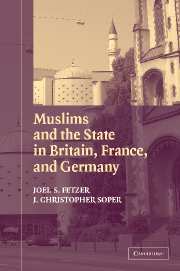Book contents
- Frontmatter
- Contents
- List of Figure and Tables
- Preface
- 1 Explaining the Accommodation of Muslim Religious Practices in Western Europe
- 2 Britain: Establishment Religion and Islamic Schools
- 3 France: Laïcité and the Ḥijāb
- 4 Germany: Multiple Establishment and Public Corporation Status
- 5 Public Attitudes toward State Accommodation of Muslims' Religious Practices
- 6 Integration and Muslim Practice
- Appendix: Survey Characteristics
- Glossary of Non-English Terms
- Bibliography
- Index
Preface
Published online by Cambridge University Press: 05 September 2012
- Frontmatter
- Contents
- List of Figure and Tables
- Preface
- 1 Explaining the Accommodation of Muslim Religious Practices in Western Europe
- 2 Britain: Establishment Religion and Islamic Schools
- 3 France: Laïcité and the Ḥijāb
- 4 Germany: Multiple Establishment and Public Corporation Status
- 5 Public Attitudes toward State Accommodation of Muslims' Religious Practices
- 6 Integration and Muslim Practice
- Appendix: Survey Characteristics
- Glossary of Non-English Terms
- Bibliography
- Index
Summary
This book began while we were working on separate projects in European immigration politics and church–state relations. Throughout this previous research, we continued to encounter the somewhat anomalous phenomenon of religiously practicing Muslims settling in largely secular Western Europe. Much of the xenophobic rhetoric of extreme right-wing parties in the region also seemed increasingly anti-Islamic rather than simply anti-immigrant. The way in which states responded to the religious needs of Muslims, moreover, seemed linked to the particular church–state institutions of that country. Ted Jelen of the University of Nevada provided the first impetus to present our ideas on this topic at an American Political Science Association panel in 1999. After publishing this paper, we then decided to pursue a book-length study of the issue.
In the interest of full disclosure, we should probably document our own religious commitments, which were the subject of much curiosity during our field work. The first author is an active Mennonite with likely Jewish ancestors. The second author is an ordained minister in the United Churches of Christ, currently belongs to an Episcopal congregation, and holds fairly orthodox Christian beliefs. At any rate, both writers are strongly committed to religious liberty for all, not just for those believers whose faith is shared by a national majority or is popular.
As coauthors, we each have our individual specializations and so divided the work on this book accordingly.
- Type
- Chapter
- Information
- Muslims and the State in Britain, France, and Germany , pp. xi - xviPublisher: Cambridge University PressPrint publication year: 2004

